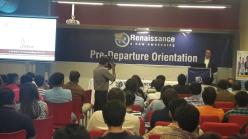International Education & Career Cast 2017 (IECC 2017) on 27th May 2017 @ Ahmedabad, Gujarat, India.

What is CPT?
CPT : Curricular Practical Training for F-1 Students in USA
Basic Information for CPT
CPT means "Legal work permit which is provided by USCIS for internships and other off-campus work opportunities before completing degree requirements with in field of your study."
If you are an F student, you have the option of training in the United States by engaging in practical training during your program. Practical training can provide valuable work experience by sharpening and adding to the skills you are learning in school. There is practical training available for F-1 students during study: Curricular Practical Training (CPT).
You should pursue Curricular Practical Training to get off-campus job or work before completing your study requirement during your F-1 Visa Status.
CPT is defined as employment which is an integral part of an established curriculum, including: “alternate work/study, internship, cooperative education, or any other type of required internship or practicum which is offered by sponsoring employers through cooperative agreements with the school.” Source: [8 CFR 214.2(f)(10)(i)].
CPT is available only prior to the completion of your degree program and you must have a job offer at the time of application. CPT employment may not delay completion of the academic program.
Curricular practical training (CPT) is an alternative work/study, internship, cooperative education or other type of required practicum that a sponsoring employer offers through cooperative agreements with your college or university. CPT is only available for F-1 students when it is part of an established curriculum within a school. CPT must be integral to your program of study; however, unlike pre-completion OPT, CPT can be full time and is not restricted by a weekly 20-hour work limit.
In order to qualify for CPT, you must be an F-1 student and have completed one full academic year of study at an SEVP-certified school, unless you are a graduate student whose program requires immediate CPT. Students who complete one year or more of full-time CPT are ineligible to participate in post-completion OPT. To get permission for CPT, your DSO needs to authorize it in SEVIS and provide you with an updated Form I-20 indicating your authorization for the training opportunity.
If you are interested in participating in CPT, you must first talk to your DSO to ensure you understand your school’s specific policy. Your DSO is the best person to work with to ensure that you follow both federal regulations and school policy.
Basic Summary for CPT
- CPT is integral to your major and the experience must be part of your program of study.
- When you enroll at the graduate level, your designated school official (DSO) may authorize CPT during your first semester if your program requires this type of experience. Ask your DSO for details.
- Your DSO will provide you a new Form I-20, “Certificate of Eligibility for Nonimmigrant Student Status,” that shows that the DSO has approved you for this employment.
- You can work on CPT either full-time or part-time.
- CPT requires a signed cooperative agreement or a letter from your employer.
- If you have 12 months or more of full-time CPT, you are ineligible for OPT, but part-time CPT is fine and will not stop you from doing OPT.
Different Type of CPT
Required CPT : Required CPT is when the academic program mandates practical work experience for all students in order to graduate.
- Cannot graduate without a department-defined work experience
- May or may not haverequired course enrollment
Optional CPT :Optional CPT is work experience directly related to your field of study that is not required.
- Not required for graduation but directly related to degree program
- Must be enrolled in and complete approved CPT course
Part-time CPT : Employment for 20 hours or less per week is considered part-time. You must be simultaneously enrolled in classes full-time and be physically present on campus in order to maintain lawful F-1 status during fall and winter terms.
- < 20 hours / week
- Must be enrolled full-time Winter & Fall semesters
- Cannot delay graduation
- No maximum
- Does not affect OPT eligibility
Full-time CPT : Employment for more than 20 hours per week is full-time. Please be aware that 12 months or more of full-time CPT will eliminate your eligibility for Optional Practical Training (OPT). During fall and winter terms, you must be enrolled full-time or have an approved Reduced Course Load (RCL).
- > 20 hours / week (no max)
- Full-time enrollment not required
- Cannot delay graduation
- No maximum
- 12 months full-time CPT eliminates OPT eligibility
Eligibility Criteria
- To be eligible for CPT, you must:
- Have been lawfully enrolled on a full-time basis for one academic year (i.e. two full consecutive terms) unless your academic program requires immediate participation for all students.
- Be in lawful F-1 status
- Have U-M approved health insurance
- Have a job offer
- Not be enrolled in an intensive English language training program
NOTE: CPT is processed and authorized term by term. Contact your academic department regarding your department's specific guidelines and follow those guidelines for CPT applications. Please note that your department has discretion in recommending CPT.

